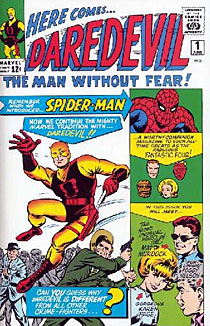
Baseball's Active Leaders, 2023
What Trump Said When About COVID
Recent Reviews
Everything Everywhere All at Once (2022)
Black Panther: Wakanda Forever (2022)
Doctor Strange in the Multiverse of Madness (2022)
Spider-Man: No Way Home (2021)
The Cagneys
A Midsummer Night's Dream (1935)
Something to Sing About (1937)
Angels with Dirty Faces (1938)
A Lion Is In the Streets (1953)
Man of a Thousand Faces (1957)
Never Steal Anything Small (1959)
Shake Hands With the Devil (1959)
Daredevil (2003)
There's only one scene in Daredevil where we witness Daredevil's alter ego, the blind lawyer Matt Murdock (Ben Affleck), in court, and he doesn't exactly instill confidence. Quesada, a Hell's Kitchen thug, is on trial for rape, and Murdock, representing the raped woman, cross-examines him. First he tells the jury that justice is blind — an obvious, and rather egotistical, allusion to himself — before tossing up some softball questions to the defendant. (Where is the prosecutor in all of this anyway?) When his heightened hearing detects Quesada lying, he grips his cane in anger but he's not smart enough to take advantage of this knowledge. Quesada is declared "Not guilty" and parties with friends that night until Daredevil breaks in, busts heads, and eventually tosses Quesada onto subway tracks where he's cut in two by an oncoming train. Justice served. But it raises a point: Would all of this vigilantism be necessary if Matt Murdock were simply a better lawyer?
Written by:
Mark Steven Johnson
Bill Everett
Brian Helgeland
(based on the comic book character created by Stan Lee and Frank Miller)
Directed by:
Mark Steven Johnson
Starring:
Ben Affleck
Jennifer Garner
Michael Clarke Duncan
Colin Farrell
Jon Favreau
Joe Pantoliano
David Keith
Coolio
Kevin Smith
Stan Lee
Frank Miller
I grew up in the Marvel comics universe (Excelsior! 'Nuff said!), and collected Spider-Man, The Fantastic Four, The Incredible Hulk, and countless others, but I was never much of a Daredevil fan. My brother was and even owned issue #1, when Daredevil wore a funky yellow-and-red suit, so I'm familiar with his origin. He just never appealed to me. He was like Batman without the cool costume and accessories. A bat strikes terror. But a daredevil?
Mark Steven Johnson, the writer-director of Daredevil, thinks otherwise. He perches his superhero on top of gothic buildings, gazing down at the criminals below, which is just the first of many similarities between his film and Tim Burton's Batman. Others: Parent murdered? Check. Murderer left calling card so identity can be discovered when child grows up? Check. "Daredevil" as mythic figure written up in tabloids? Check. Reporter hot on trail of mythic figure? Check. Hero emotionally tortured? Check. Johnson even gives DD an Alfred-like figure in the form of a priest who refuses to hear Matt Murdock's confessions.
If the movie had continued in this vein it would have been simply derative. Instead it's so uneven as to be unwatchable. It can be gloomier, moodier than Batman — DD's body is riddled with scars, he pulls out a tooth in the shower, and he relies on prescription pain-killers — but it also goes for the lightness of the first Spider-Man movie. Murdock is positively breezy when he attempts to pick up Elektra (Jennifer Garner) in the coffee shop, or when he's verbally sparring with his partner, "Foggy" Nelson (Jon Favreau — the best thing in the movie), or when he's physically sparring with Elektra in the kid's playground, a scene that really didn't work for me. Why would Elektra — with decades of martial arts training — attempt to fight a blind man? Why would Murdock risk his secret identity to pick a fight with a girl? And haven't we seen enough of this stuff already? When they first set up in martial arts poses, with a kind of "Come and get me" flick of the fingers, I sighed with boredom. More white stars doing Jet Li without his talent.

Golden Age: When comic books cost 12 cents and Stan Lee wrote them
Elektra, it turns out, is the rich daughter of Nikolaos Natchios (Erick Avari), who happens to be the right-hand man of Kingpin (Michael Clarke Duncan), who happens to be the crime lord of Hell's Kitchen and the man... wait for it... who murdered Daredevil's father. Natchois wants out, though, so Kingpin hires an Irish assassin, Bullseye (Colin Farrell), to kill him. Dare I mention the complications? Bullseye pulls it off but Elektra blames Daredevil — shades of Harry Osborne in Spider-Man — so Daredevil and Elektra fight it out. At one point Daredevil is speared with a blade through the shoulder, his life passing before his eyes. Minutes later, without any medical attention, he's defeating Bullseye and Kingpin in spectacular fashion. How? He has no recuperative powers. He's an ordinary guy, remember? Pulling out teeth, etc.
Other stumbling blocks: Why is Daredevil so egotistical to leave his initials — in gasoline — at the scene of a crime? And why is it so easy to learn his secret identity? By the end of the pic half of Manhattan knows it, including the Kingpin, who lives because — in a "moment of truth" moment we've seen a thousand times and would've been dull no matter which way the sword fell — DD decides not to be a bad guy. Good for him. It means Foggy Nelson better develop eyes in the back of his head.
Final note: "Hell's Kitchen" is a cool name but it's full of bankers now. FYI.
—February 17, 2003
© 2003 Erik Lundegaard







